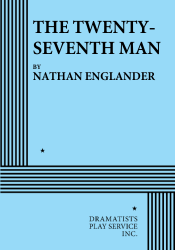THE STORY: The setting is a Soviet prison, 1952. Joseph Stalin’s secret police have rounded up twenty-six writers, the giants of Yiddish literature in Russia. As judgment looms, a twenty-seventh suddenly appears: Pinchas Pelovits, unpublished and unknown. Baffled by his arrest, he and his cellmates wrestle with the mysteries of party loyalty and politics, culture and identity, and with what it means to write in troubled times. When they discover why the twenty-seventh man is among them, the writers come to realize that even in the face of tyranny, stories still have the power to transcend. In his last act of storytelling, Pelovits asks us: Who writes the eulogy when all the writers are gone?
“Nathan Englander…asks some potent questions about the nature of the writer’s art…dark reflections on the brutalities of the Stalin regime, the death of Yiddish culture and the nobility that inheres in the act of creation, even in the face of apocalyptic destruction.” —The New York Times.
“An understated, quietly powerful meditation on identity and culture…THE TWENTY-SEVENTH MAN is a meditative look at an attempt to eradicate a civilization by getting rid of its writers.” —New York Post.
“A truly powerful examination of the slow suffocation of words, culture, and, ultimately, truth that occurs under despotic rule.” —Entertainment Weekly.
“Nathan Englander’s exquisite THE TWENTY-SEVENTH MAN is in some sense a kaddish for a Yiddish world that was systematically erased, first by Hitler’s ovens ('My readers are smoke,' Zunser notes) and then by Stalin’s purges (including the massacre known as the Night of the Murdered Poets). But Englander’s play doesn’t just mourn that sensibility; it reproduces it with profoundly beautiful layers of irony, resignation, righteous anger, gallows humor and philosophical disputation…as chilling and haunted as a ghost story. The final scene brought tears to my face, not just in the theater but in writing this sentence: for what was lost, and even more, for all that was never to be.” —Time Out New York.
“Englander has written a play—his first—that has the steady, considered narrative propulsion of his stories, and their delicacy, too…exceptional thought, and original dramatic gifts…one hopes that he writes, in addition to his moving prose tales, play after play after play, because what he does is rare: he marries thought to action.” —The New Yorker.
